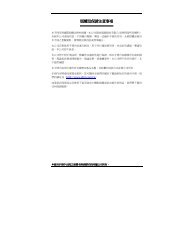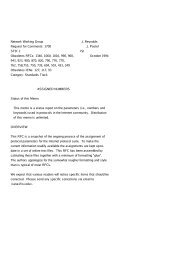Network Working Group R. Fielding Request for Comments: 2616 ...
Network Working Group R. Fielding Request for Comments: 2616 ...
Network Working Group R. Fielding Request for Comments: 2616 ...
Create successful ePaper yourself
Turn your PDF publications into a flip-book with our unique Google optimized e-Paper software.
compatibility with RFC 2068, a server MAY send a 100 (Continue)status in response to an HTTP/1.1 PUT or POST request that doesnot include an Expect request-header field with the "100-continue" expectation. This exception, the purpose of which isto minimize any client processing delays associated with anundeclared wait <strong>for</strong> 100 (Continue) status, applies only toHTTP/1.1 requests, and not to requests with any other HTTPversionvalue.- An origin server MAY omit a 100 (Continue) response if it hasalready received some or all of the request body <strong>for</strong> thecorresponding request.- An origin server that sends a 100 (Continue) response MUSTultimately send a final status code, once the request body isreceived and processed, unless it terminates the transportconnection prematurely.- If an origin server receives a request that does not include anExpect request-header field with the "100-continue" expectation,the request includes a request body, and the server respondswith a final status code be<strong>for</strong>e reading the entire request bodyfrom the transport connection, then the server SHOULD NOT closethe transport connection until it has read the entire request,or until the client closes the connection. Otherwise, the clientmight not reliably receive the response message. However, thisrequirement is not be construed as preventing a server fromdefending itself against denial-of-service attacks, or frombadly broken client implementations.Requirements <strong>for</strong> HTTP/1.1 proxies:- If a proxy receives a request that includes an Expect requestheaderfield with the "100-continue" expectation, and the proxyeither knows that the next-hop server complies with HTTP/1.1 orhigher, or does not know the HTTP version of the next-hopserver, it MUST <strong>for</strong>ward the request, including the Expect headerfield.<strong>Fielding</strong>, et al. Standards Track [Page 49]RFC <strong>2616</strong> HTTP/1.1 June 1999- If the proxy knows that the version of the next-hop server isHTTP/1.0 or lower, it MUST NOT <strong>for</strong>ward the request, and it MUSTrespond with a 417 (Expectation Failed) status.













